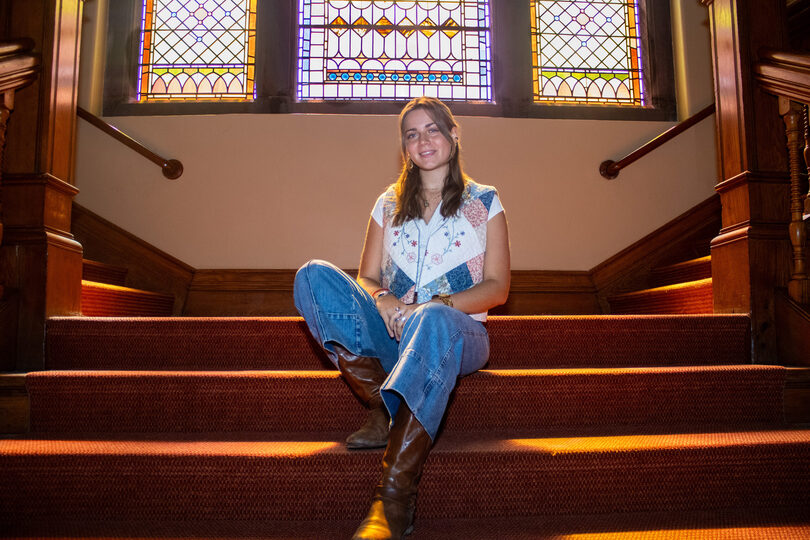SU senior blends pieces, generations in sustainably-focused item repairs

Syracuse University industrial design senior Lilyan Minicozzi is inspired by the outdoors and protecting nature in her sustainable, repurposed projects. Leonardo Eriman | Photo Editor
Get the latest Syracuse news delivered right to your inbox.
Subscribe to our newsletter here.
Lilyan Minicozzi stands behind a 1970s JanSport backpack, holding onto its protruding metal frame. The leather patches on the top are growing mold. The front hangs open — Lilyan has removed the patch and zippers.
Where some would see a useless item, Lilyan sees an opportunity to create something new: she used the detached pieces as additions to a new backpack.
“While I was putting the pieces together, I actually wasn’t building a backpack, but building a story of other people exploring outside,” she said.
The Syracuse University industrial design senior focuses on giving new life to old items by repairing and repurposing them — whether it’s through her brand LilacSun, mending workshops or her recent project, “Full Circle.” LilacSun was part of the local vintage clothing store, The Cherry Pit, which she ran with her older sister, Abigail Minicozzi.
Lilyan founded LilacSun in high school, but she’s been sewing and repurposing since she was little. When she wanted something, she made it. When something was broken, she fixed it. Once Lilyan realized she didn’t need anything else for herself, she started selling items to friends — the beginning of LilacSun.
Though Lilyan’s items were widely popular at The Cherry Pit, she said she doesn’t create for a specific audience.
“I feel like I’m mostly creating something I would want, and then it creates an outlet for me to relate to people and people to relate to me,” Lilyan said.
Since the beginning of her time at SU, Lilyan’s work has shifted from aesthetic accessories to more industrial and useful items, said Sarah Mason, Lilyan’s best friend and a fellow industrial design major.
Now, instead of turning jeans into bucket hats or bed sheets into tote bags, Lilyan has transferred her energy to repairing items and giving them new life. She’s recently moved her brand in a service-based direction by hosting repair events at flea markets in the area. Lilyan posts on social media before the event, encouraging people to bring items they need mended.
“I feel like at this point, the business is part of me,” Lilyan said. “Every time I go through a different phase of life, I change the business model, and I change the way the business exists for me.”
In need of a quick stitch, Lilyan’s friends, including Mason, often ask her to fix things. Lilyan has mended an array of items for Mason, from broken bras to a busted backpack. Mason sits with Lilyan as she repairs the items, learning how to do it herself for the future.
Lilyan has also grown a presence on social media, building a following of users who want trendy items but like the idea of them being made locally and sustainably. Her account features content about her repurposing projects. The positive feedback from viewers who wanted to learn how to fix things themselves has been encouraging, she said.
As her older sister and fellow creative, Abigail has watched Lilyan grow as an artist since they shared a childhood brand “Lilabby” (a combination of their two names). Abigail said she’s enjoyed seeing her sister’s confidence grow as a businesswoman and designer.
“She’s just very knowledgeable, and I think being able to do that in front of clients and a community, really strengthened her confidence,” Abigail said. “She always had the skill, but I think that just made her more of a leader.”
Though Lilyan has sewn and repaired a myriad of items, sustainability is the thread that binds them all together. The outdoors is her biggest inspiration, she said, so protecting it ranks high on her list of priorities. Creating sustainable items inspired by nature helps her creative process.
“Her passion for sustainability isn’t coming from the popularization of the green market,” Mason said. “It’s truly because she cares about the planet and she wants the world to look better for the next generation.”
While it’s easy to post your feelings about the environment online, making a real piece of art draws a deeper awareness, Lilyan said. She tries to create a new angle on the issue of sustainability to get people emotionally attached to the cause.
Instead of encouraging people to care about the environment and live sustainably because it’s an important asset that needs fixing, Lilyan emphasizes items’ past lives. She hopes that when people consider an item’s story it will make them consider its value. It’s an intersection of storytelling and activism, she said.
Lilyan’s values of storytelling, sustainability and repair culminated in her recent project “Full Circle,” which was funded by the Center for Fellowship and Scholarship Advising and the Syracuse Office of Undergraduate Research and Creative Engagement.
The project started with Lilyan’s idea to build a backpack out of used materials. She distributed flyers around the Syracuse community requesting used outdoor gear. While gathering the old camping equipment, she also gathered the stories behind the items, adding a narrative element to the project, she said.
Her most impactful anecdote came from the 1970s JanSport backpack, Lilyan said. Its owner, a lover of the outdoors, passed away, but his family couldn’t bring themselves to get rid of the backpack. Instead of trashing it, they passed it to Lilyan.
Lilyan is constructing a five-panel hat that will bear the leather logo from the original backpack. She hopes to gift the hat back to the family as a way to connect stories and family ties.
“Maybe his grandson could wear this hat and think of his grandfather’s exploration of the outdoors,” Lilyan said.
Lilyan created the hat and the backpack out of the JanSport along with other camping gear she collected. The backpack bursts with color and functional details. Cup holders from a camping chair became water bottle holders on the sides. The seat of the chair became the flap of the pack, while two parts of a climbing harness became supportive waist straps. The colorful details on the front of the pack come from gutted climbing ropes.

In her project “Full Circle,” Lilyan Minicozzi built a backpack out of community-sourced outdoor gear. Courtesy of Lilyan Minicozzi
Lilyan couldn’t imagine just throwing these items away, she said.
Brands like Patagonia and REI, which have reused gear programs built into their companies, are big inspirations to Lilyan. After she graduates, she hopes to find her place in the outdoor clothing industry using the ideologies and processes she developed through “Full Circle” to inform her work.
Abigail doesn’t doubt that Lilyan will achieve her goals.
“I think no challenge is too big for her,” Abigail said. “She approaches things with confidence and ease that other people don’t. Nothing is too big or small, she’ll always find a very creative way to solve a problem.”
Lilyan brought her consideration for the environment to her work at the McCarthy Mercantile. The Cherry Pit was housed in the McCarthy Mercantile until its closure last year.
Micheal John Heagerty, the owner of McCarthy Mercantile, said he’s always been impressed by the creativity Lilyan brings to upcycling. She takes forgotten things and reenvisions them, Heagerty said.
“Every ounce of what Lilyan does is advocacy, because she’s completely reusing, renewing, reimagining,” Heagerty said. “When it was LilacSun, her handmade goods had that touch, and then she got into fixing things and adding.”
Heagerty believes the “Lilyans of the world,” who focus on handmade customization, will hold the next wave of popularity.
He brought Lilyan into the McCarthy Mercantile as a trainee, giving her an opportunity to receive mentorship and inspiration from other artists working there. However, he soon realized that even as a 17-year-old, she was established enough to make an impact and run her own business.
Heagerty described both Minicozzi sisters as fiercely independent and incredibly talented. He said Lilyan always brings care and quality to what she makes, and excels at turning her creative drive into ideas for her brand.
“I don’t want to sound like I’m blowing too much smoke up, but to be pretty honest, she’s insane,” Heagerty said.
When Lilyan finishes the creative process and hands off her creation, she hopes her customer is intentional about choosing to buy from her. Machine-made items don’t compare to handmade products, she said. When manufactured products aren’t useful anymore, it’s much easier to get rid of them. Lilyan hopes her products will be long lasting, not disposable.
“I would hope that when someone consumes a product that I made in my own hands, and I spent my own time and energy on, that they value that, and they want to carry it with them for as long as possible,” she said.






